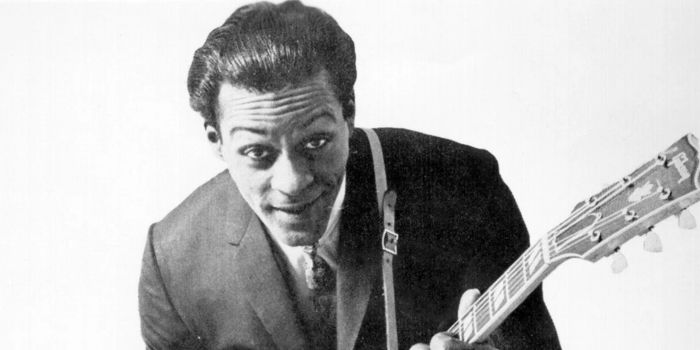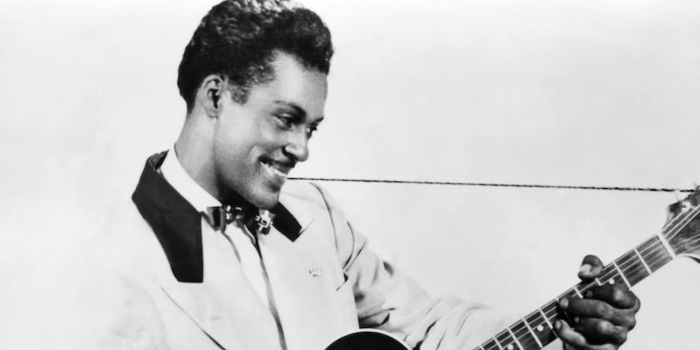Chuck Berry was an American singer, guitarist, and songwriter. Nicknamed the “Father of Rock and Roll,” he is often referred to as the pioneer of rock and roll music. He refined and developed R&B into major elements that made rock and roll a distinct sound.
His influence on music has been far-reaching. He is credited as an influence on a number of musical acts including David Bowie, and AC/DC. As the pioneer of the genre, his song, Johnny B. Goode is the only rock and roll song included on the Voyager Golden Record.
Chuck Berry’s Family Supported His Music Career

He was born Charles Edward Anderson Berry on 18 October 1926 in St. Louis, Missouri, United States. Chuck Berry died on 18 March 2017 near Wentzville, Missouri. He was the youngest child and grew up in a middle-class family. As a result of his upbringing, he was able to pursue his interest in music from an early age. He gave his first public performance in 1941 while still a high school student.
In 1944, he was still in high school when he was arrested for armed robbery after robbing three shops and stealing a car at gunpoint with some friends. He was convicted and sent to a reformatory for young men. At the reformatory, he formed a singing quartet. His singing group was enough that they were allowed to perform outside the detention facility. He was released in 1947.
Berry got married on 28 October 1948 to Themetta Suggs. To support his family, he worked several jobs in St. Louis and also worked with local bands in clubs to earn extra income. His showmanship and mix of country and R&B tunes, brought in a wider audience, particularly affluent white people.
He Got His Big Break In His 30s

His music career break came in May 1955 when he travelled to Chicago and met Muddy Waters, who suggested he contact Leonard Chess, a record company executive. He signed with Chess Records and recorded an adaptation of the American traditional song, Ida Red, under the title Maybellene. The song sold over a million copies, reaching number one on Billboard magazine’s Rhythm and Blues chart.
By the end of the 1950s, Chuck Berry was a household name with several hit records. He also had a lucrative career touring the country. In June 1956, his song Roll Over Beethoven reached number 29 on Billboard’s Top 100 chart, and he toured as one of the “Top Acts of ’56”. Then in 1957, he took part in the “Biggest Show of Stars for 1957” which toured the United States.
In December 1959, he was arrested after allegations that he had sexual intercourse with a 14-year-old girl whom he had transported across state lines. He served one and a half years in prison, from February 1962 to October 1963. However, during this period, interest in his music was sustained by other bands releasing covers of his songs. After his release from prison, he released eight singles, and between 1966 and 1969, he released five albums for Mercury Records. He returned to Chess Records from 1970 to 1973. In the late 1970s, he once again faced criminal charges, pleading guilty to evading federal income tax. He was sentenced to four months in prison and 1,000 hours of community service.
Chuck Berry’s Influence on Rock and Roll

As the “Father of Rock and Roll”, Chuck Berry’s influence on the genre cannot be overstated. Berry was a significant influence on the development of both the music and the attitude associated with the lifestyle of rock music. He made rock and roll distinctive by refining and developing rhythm and blues into the major elements of rock itself.
He is widely credited for contributing a focus on the guitar riff as the primary melodic element and an emphasis on telling stories through songwriting to rock music. Chuck Berry also introduced a distinctive guitar-playing style that combined elements of blues and country. Berry is included in several of Rolling Stone magazine’s “Greatest of All Time” lists.
What Is His Legacy?

Chuck Berry has been cited as a major reference to some of the most influential musicians of all time including The Beatles, Elvis Presley, Jimi Hendrix, and The Rolling Stones. He has also received various awards honouring his legacy to Rock and Roll and music in general. He received the Grammy Lifetime Achievement Award in 1984, and the Kennedy Center Honors in 2000.
Berry has been included in several of the “Greatest of All Time” lists published by Rolling Stone magazine. His song “Johnny B. Goode” was ranked first in the “100 Greatest Guitar Songs of All Time” in June 2008. On the opening of the Rock and Roll Hall of Fame in 1986, he was one of the first musicians to be inducted.
 Follow Us
Follow Us





